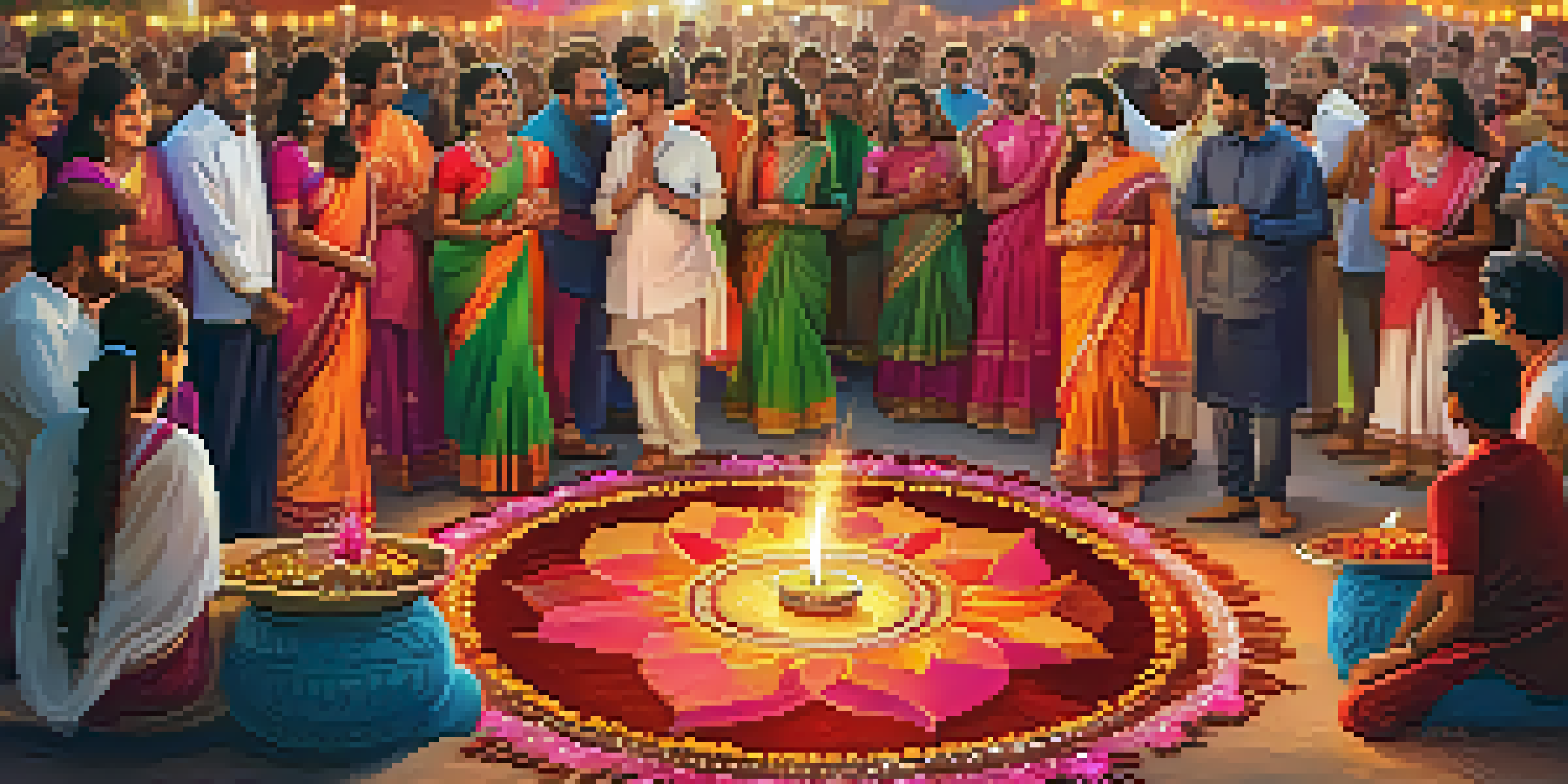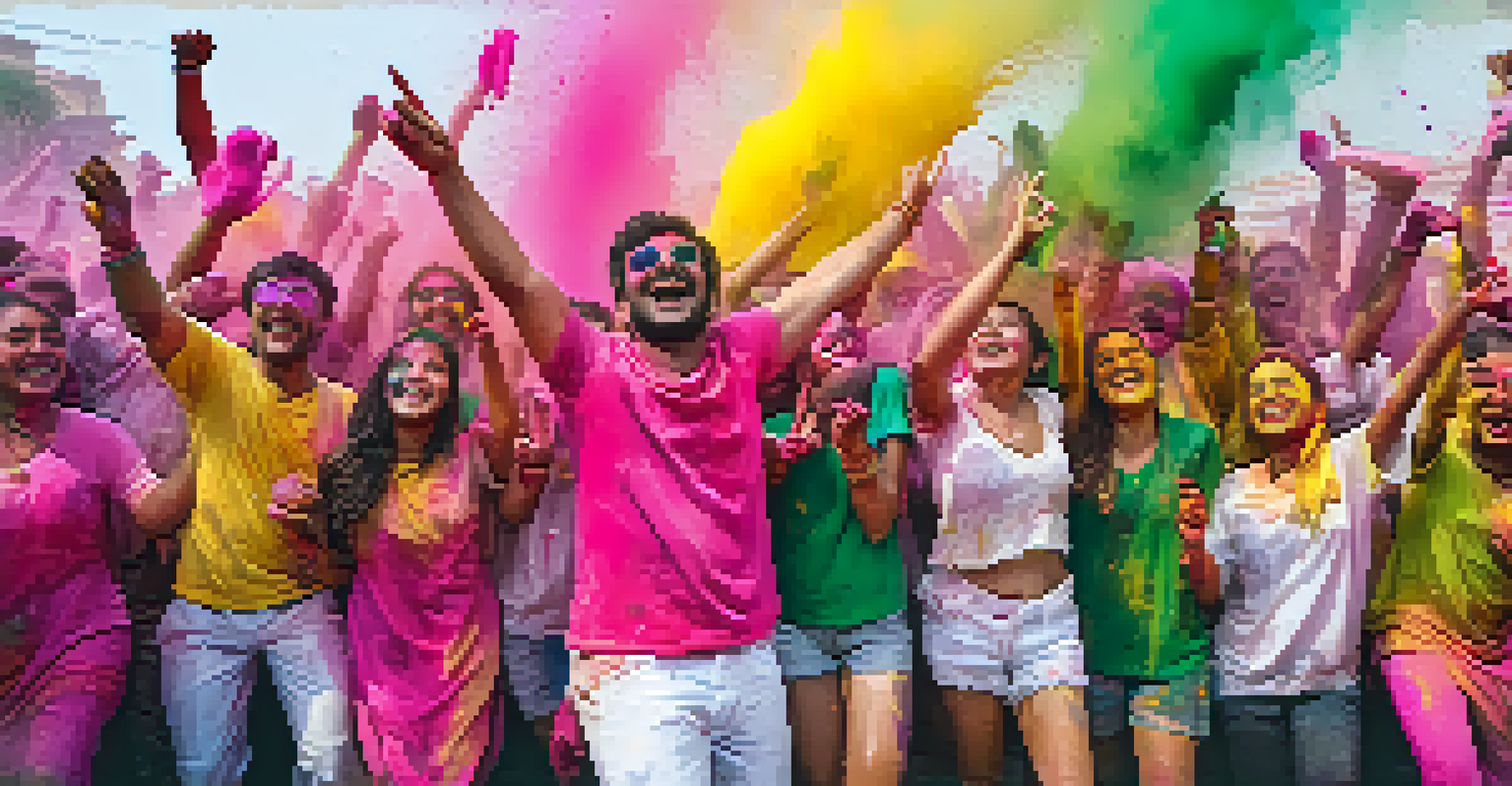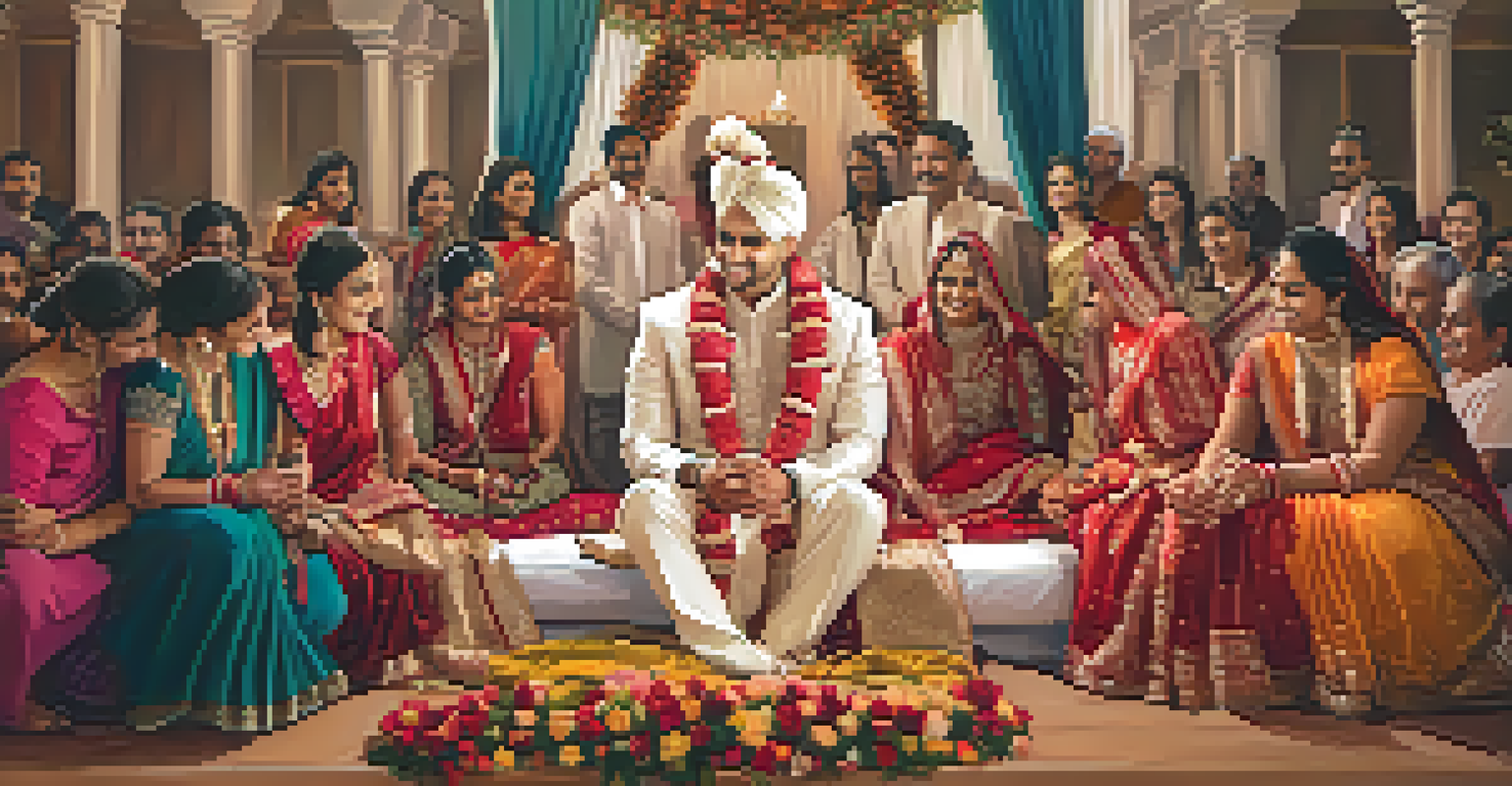Understanding Indian Festivals: Etiquette for Visitors

The Significance of Festivals in Indian Culture
Festivals in India are more than just celebrations; they are a tapestry of traditions, values, and communal spirit. Each festival has its own unique story, often rooted in ancient mythology or seasonal changes, making them an integral part of Indian identity. For visitors, understanding this significance can deepen their appreciation of the festivities and the people participating in them.
Festivals are a way to connect with our roots and celebrate our culture.
For instance, Diwali, the Festival of Lights, symbolizes the victory of light over darkness and good over evil. It's a time when families come together to celebrate with joy, prayers, and fireworks, creating an atmosphere that's both festive and heartfelt. Being aware of such meanings can help visitors engage more meaningfully with the celebrations.
Moreover, festivals often foster a sense of unity and belonging, not just among locals but also for those who visit. When you grasp the essence of these celebrations, you’re more likely to embrace the spirit of togetherness that defines Indian culture.
Dress Appropriately for the Occasion
When attending an Indian festival, your attire can speak volumes about your respect for the culture. Traditional clothing like sarees for women and kurta-pajamas for men can be a wonderful way to blend in and show appreciation for the occasion. Bright colors are often favored during festivals, so don’t hesitate to express your vibrant side!

However, it’s essential to consider the specific customs of the festival you’re attending. For example, during Holi, the festival of colors, old clothes are usually worn because they’re likely to get stained. On the other hand, during weddings or religious ceremonies, it’s best to opt for more formal or traditional attire.
Festivals Reflect Indian Identity
Festivals in India weave together traditions and communal spirit, enhancing both local and visitor experiences.
In essence, dressing appropriately not only shows respect but also enhances your experience by allowing you to feel part of the celebration. Plus, you might just enjoy the compliments and camaraderie that come with wearing traditional attire!
Learning Basic Greetings and Phrases
One of the simplest yet most impactful ways to connect with locals during festivals is by learning a few basic greetings in Hindi or the regional language. Simple phrases like 'Namaste' (hello) or 'Shubh Diwali' (Happy Diwali) can go a long way in breaking the ice and showing your interest in the culture. People appreciate it when visitors make an effort to speak their language.
Food is not just what we eat; it’s a part of who we are, and sharing it is a way to build community.
Moreover, greetings are often accompanied by gestures that carry cultural significance. For instance, the traditional 'Namaste' involves pressing your palms together and bowing slightly, which conveys respect. Understanding these nuances can enrich your interactions and leave a lasting impression.
Ultimately, a little effort in learning greetings not only enhances your experience but also opens doors to deeper conversations and connections with the local community.
Respect Religious Customs and Practices
India is a land of diverse religions, each with its own set of customs and rituals, especially during festivals. When attending religious ceremonies, it's crucial to be respectful of the practices you witness. This could mean removing your shoes before entering a temple or covering your head in certain places of worship.
For example, during Ganesh Chaturthi, a festival dedicated to Lord Ganesha, you might see processions and idol immersions. Participating respectfully can show your appreciation for the culture while also allowing you to experience the richness of the celebrations firsthand.
Respect Local Customs
Understanding and adhering to local customs during festivals fosters goodwill and enriches your cultural experience.
Understanding and respecting these customs not only enhances your experience but also fosters goodwill between you and the local community, paving the way for meaningful interactions.
Participate in Local Customs and Traditions
One of the best ways to immerse yourself in Indian festivals is by participating in local customs and traditions. Engaging in activities like dancing during Bhangra at a Punjabi festival or joining in the color play of Holi can create unforgettable memories. Locals often appreciate when visitors show enthusiasm for their traditions.
However, it’s important to observe first before jumping in. Watching how locals engage in certain activities can provide insight into the appropriate way to participate. This not only helps you blend in but also ensures that you're respecting the customs.
Participating in local traditions can foster a genuine connection with the community, allowing you to experience the joy and spirit of the festival more fully.
Gifts and Offerings: What to Bring
Bringing a small gift or offering when visiting during a festival can be a thoughtful gesture. In many Indian cultures, sweets, fruits, or flowers are commonly given during festivals as they symbolize goodwill and joy. It's a simple act of kindness that can be greatly appreciated by your hosts.
When choosing a gift, consider the preferences of the family or community you are visiting. For example, during Diwali, gifting sweets or decorative items is customary. On the other hand, during Eid, offering dates or savory snacks can be more appropriate.
Engage in Community Activities
Participating in communal celebrations during festivals creates memorable connections and deepens your appreciation of local culture.
Ultimately, thoughtful gift-giving enhances your experience and deepens relationships with those you meet during the festivities.
Food Etiquette During Festivals
Food plays a central role in Indian festivals, often becoming a highlight of the celebrations. As a visitor, it's important to be mindful of dietary restrictions and preferences, especially since many people follow vegetarian or vegan diets for religious reasons. Asking about ingredients before indulging is a respectful way to navigate this culinary landscape.
Moreover, sharing food is a common practice during festivals. If invited to someone's home, it’s polite to try a bit of everything offered, as it shows appreciation for the effort put into the meal. However, if you have specific dietary restrictions, communicate them gently to your hosts.

Being respectful and open-minded about food during festivals not only enriches your experience but also allows for delightful culinary discoveries.
Understanding the Importance of Community
Indian festivals are as much about community as they are about individual celebrations. Many festivals involve communal activities, whether it's decorating public spaces, organizing cultural performances, or participating in rituals as a group. For visitors, recognizing this sense of community can enhance your experience and encourage greater participation.
Engaging with locals during these communal activities, like joining in a group dance or helping with decorations, can create bonds and memorable moments. It’s a wonderful way to feel the pulse of the festivities and connect with the spirit of the celebration.
In conclusion, appreciating the community aspect of Indian festivals invites you into a world of shared joy and togetherness, making your visit all the more special.